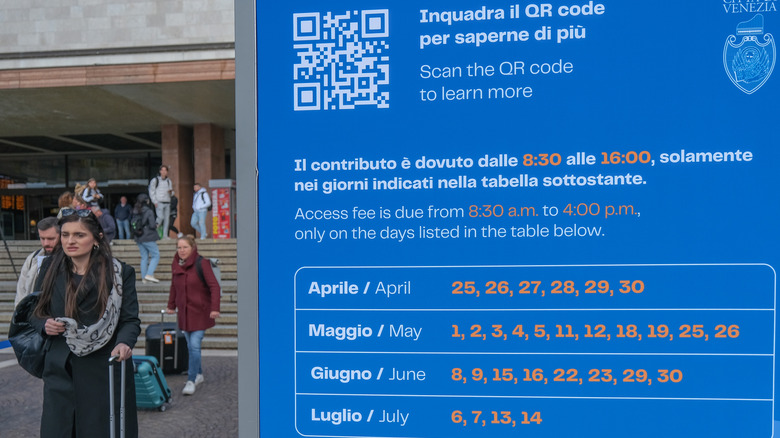Why Venice's Entry Fee Is More Controversial Than Other Countries' Tourist Taxes
Venice is a city steeped in history and culture, but admittedly, it can also kind of feel like a theme park — think gondola rides down the iconic canals, Rialto Bridge with its shops and eateries, and the streets and buildings that look plucked from a painting. Plus, avoiding the crowds in Venice can be nearly impossible. On busy days, tourists can even outnumber the locals. Overall, a trip to Venice can make you wonder if you're visiting a real city or Disneyland.
Venice's government knows overtourism is a significant problem plaguing the Italian destination, and in an attempt to support its infrastructure and discourage hoards of people from visiting, it started charging visitors a fee just to enter. The tourist entry fee started in 2024 as part of a trial program and costs five euros per person per day. However, if the strategy is adopted permanently, the fee could be doubled to 10 euros per guest.
Express reported that the initiative raised 977,430 euros (over $1 million) within just 11 days of launching — the result of selling over 195,000 tickets to tourists. While that might sound like a roaring success for the city, the entry fee program remains controversial.
Many Venetians are against the tourist entry fee
Tourist taxes when visiting Europe aren't a new concept, but Venice's entry fee has attracted a lot of disapproval — and not necessarily from travelers themselves. Tourists appear largely unfazed by the fee and continue to flock to the Italian hotspot just as they did before the entry ticket program started. Meanwhile, some of the city's residents have taken a stand against the new measure.
Protests have been spotted since the fee was first put in place, and demonstrators have gone head-to-head with riot police on Venice's famous streets. Some locals complain that funds from the tourist tickets aren't going to provide what residents really need: more long-term housing and a livable environment for Venetians.
Others have noted that the rules of the new fee scheme are overly complex and confusing. For one, people who live in the Veneto region are allowed to enter Venice without paying, even though they make up a large share of the city's visitors. Moreover, guests are required to register information in a database, which some view as an invasion of privacy. Even if officials work through these issues, critics argue that the program won't even make a dent in the city's overtourism woes.
Can you avoid paying the tourist fee in Venice?
Skipping paying Venice's tourist fee could result in a fine of at least 50 euros (about $55) — much higher than the daily fee itself. However, there are a few ways to avoid paying the five euro charge without facing costly repercussions. First, the fee is part of a pilot program that, as of 2024, is only set to run on certain days between late April and mid-July, including most weekends. If you want to experience summer weather in Venice, expect to shell out a few extra euros, while traveling off-season could help you save.
Another way to avoid the fee is by staying in the city overnight. As it currently stands, only day trippers are required to pay the entrance fee. If you book a hotel room or accommodation, you're exempt from paying (though you still have to register). Additionally, students, tourists under the age of 14, Venetian natives and residents, and local workers don't have to pay to enter. And if you're a sports fan, you might be in luck: The Guardian reported that those attending a Venezia FC match can skip the city's entrance fee, too.
Befriending a Venice resident could also save you five euros. Visitors who have an invite code from a local aren't viewed as regular tourists and can evade the fee. Considering many Venetians are against the measure, you might just be able to snag a code from a helpful "friend" online.


